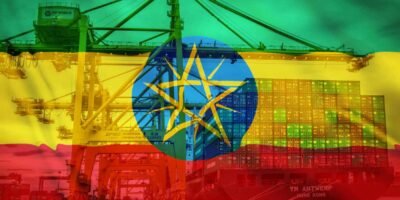Ever wonder why Western leaders seem so worried these days about the BRICS expansion? These emerging powerhouses (Brasil, Russia, India, China, and South Africa) are reshaping global politics and threatening Western dominance on the world stage. For decades, the US and Western Europe have called the shots in global affairs. Now the tables are turning as BRICS flex their economic and political muscles.
BRICS countries combined are home to over 3 billion people and represent 40% of the world’s population. These rising giants have a combined GDP of over $15 trillion. They hold annual meetings, creating new global institutions to challenge Western control of global governance. The West fears losing its grip on power as the world transitions to a multipolar system where non-Western values and interests shape global affairs.

The BRICS Expansion
The fear in the Western political and economic circuits is growing bigger by the day because the initiative is likely to expand even further. BRICS is set to welcome six new member countries on January 1, 2024, which include Argentina (despite opposition from a major opposition presidential candidate), Egypt, Ethiopia, Iran, Saudi Arabia, and the United Arab Emirates.
Additionally, a total of 14 countries have formally applied for BRICS membership. Algeria, Bahrain, Bangladesh, Belarus, Bolivia, Cuba, Honduras, Kazakhstan, Kuwait, Palestine, Senegal, Thailand, Venezuela, and Vietnam have submitted their applications, with Algeria expected to join in the next expansion after applying in 2022, and others applying in 2023.

BRICS Financial Architecture
So, which are the basic economic mechanisms that drive such a global interest for joining the new bloc? How is BRICS structured institutionally? To understand this, we’ll have to take a look at the key segments of the BRICS model, such as the New Development Bank (NDB) and the Contingent Reserve Arrangement (CRA).
New Development Bank (NDB)
The NDB, also known as the BRICS Development Bank, is a collaborative effort of the five nations. It focuses on funding infrastructure projects, with an annual lending capacity of up to $34 billion. South Africa hosts its African headquarters.
The bank started with a $50 billion capital, contributed initially by Brazil, Russia, India, China, and South Africa. By 2020, it had 53 ongoing projects valued at around $15 billion. In 2021, Bangladesh, Egypt, the United Arab Emirates, and Uruguay joined the NDB.
BRICS Contingent Reserve Arrangement (CRA)
The CRA acts as a safeguard against global liquidity challenges, addressing issues like adverse impacts on national currencies due to global financial pressures. Established in 2015, it competes with the International Monetary Fund (IMF) and symbolizes increased South-South cooperation.
The legal foundation is the Treaty for the Establishment of a BRICS Contingent Reserve Arrangement, signed in 2014. The CRA became operational in 2015 after ratification by all BRICS states.
BRICS Payment System
During the 2015 BRICS summit, ministers from member nations began discussions on an alternative payment system to SWIFT, aiming to conduct settlements in national currencies. Russia introduced its alternative, the Cross-Border Interbank Payment System, ensuring global financial institutions could exchange transaction information. India has its Structured Financial Messaging System (SFMS), and Brazil employs Pix.
At the 2023 BRICS summit in South Africa, member countries pledged to explore the feasibility of a common currency. The aim is to enhance international trade fairness, simplify transactions, and significantly reduce costs.

Various Ways in Which BRICS Institutions Can Destabilize the Western Economical Models
With BRICS on the rise, Western dominance may soon be a thing of the past. The expanded BRICS is set to surpass the G7 in significance, given its larger combined GDP. This assertion comes from none other than the renowned economist Jeffrey Sachs in a recent interview.
Influence inside the World Trade Organization
This new alliance quickly showed its political impact at the 2003 WTO summit in Cancun. Although the term “BRICS” wasn’t used because Russia wasn’t a World Trade Organization (WTO) member, three BRICS nations (India, China, and Brazil) teamed up with other emerging countries to disrupt the Doha round agreement. They opposed a proposed cut in American and European agricultural subsidies, which they deemed inadequate.
This move was a significant challenge to the plans secretly prepared by Europeans and Americans. It had significant political consequences, playing a role in changing WTO governance. The World Trade Organization (WTO) has become more democratic, with Europeans and Americans no longer the exclusive key players.
Targeting the U.S. Dollar
China and Russia in particular aim to destabilize the dollar system. They have signed numerous trade and investment deals denominated in rubles and yuan instead of dollars.
They have also been buying up gold reserves and selling U.S. treasury securities, slowly divesting from the dollar. Some analysts warn that if BRICS start conducting most of their business in non-dollar currencies, trillions of dollars could flood back into the U.S., spurring high inflation.
Political Influence on Developing Countries
The core political differences between the two blocs may yet be the strongest weapon against Western dominance on the global stage. Unlike the Western emphasis on universal values and interventions based on ‘human rights considerations’, the BRICS nations emphasize cultural diversity and respect for national sovereignty as essential tenets of their foreign policy.
The brutal wars in Iraq, Libya, Afghanistan, Yugoslavia, and elsewhere ruined the image of the liberal democracies led by the U.S. irreversibly. The political system, aiming to present itself as humane and peace-promoting, weakened its own image by permitting severe acts of destruction in the pursuit of democracy. The suspicion towards the West grew with each war and has reached a critical juncture, shifting dynamics in global relations towards BRICS.

Opinion instead of a Conclusion
All of this may prove disastrous for the western democracies. Not only that African, Eastern European, or Asian countries turn their gaze towards BRICS but Western societies are starting to doubt themselves. The huge rise of political populism in the United States, the UK, Hungary, Poland, and so on are clear examples of this.
We’ve witnessed some disturbing scenes with the violent protests after the Trump – Biden elections in the U.S., and even more violent and long-lasting protests in France in the past decade or so. These are all signs of the decline of neoliberalism. America, Australia, Japan, and Europe will have to redefine their values in order to seriously oppose BRICS in the not-so-far future.
One thing is certain – the era of Western hegemony is ending. The Global South is rising and demanding more say in world affairs. Globalization is giving way to a new form of sovereignty as countries reassert control over their political and economic destinies. The future is uncertain but one thing is clear – the West will have to learn to share power on the global stage. The age of BRICS is here.




Leave a Reply